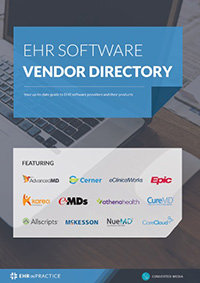How to select an EHR consultant
What is an EHR Consultant?
"EHR consultant" is a broad term that covers a wide range of experts who have the leveraged knowledge and extensive skill sets necessary to optimize electronic health record (EHR) software systems. They are specialized types of health IT professionals who work with organizations to ensure that their electronic health records (EHRs) are compliant with federal regulations.
While patient management consultants primarily work on financial and administrative matters, the job of EHR consultants focuses on the clinical. Their job can be varied, depending on the needs of the employer and the size of the practice or facility. Some consultants may only be responsible for ensuring that an organization has the proper EHR software installed and is using it correctly, making sure it meets all necessary standards and getting actively involved in reviewing physician documentation.
They may also need to train physicians on how to employ a specific EHR system effectively. Others may have more diverse responsibilities, such as helping their employer comply with HIPAA (Health Insurance Portability and Accountability Act) regulations.
What are the pros and cons of working with EHR consultants?
Working with EHR consultants can be a great way to get an EHR system up and running. Here are some pros and cons of working with such experts:
Pros
1. EHR Implementation, Integration, and Optimization Professionals
EHR consultants provide healthcare organizations with the knowledge, tools, and expertise they need to achieve a successful integration of their EHR system. Since EHR provides a much more comprehensive view of patient care compared to electronic medical record consultants, they are adept when it comes to the design and deployment of systems that will allow them to integrate data across healthcare settings.
They are also involved in optimization work to enhance an organization's EHR system by using strategies that are tailored for specific types of hospitals, departments, or clinical services. These reviews or technology optimizations include improving data quality through structured data extraction, helping clinicians communicate more effectively through improved workflow process mapping, and designing user-friendly interfaces through user research methods.
2. Data Migration Specialists
From paper records to electronic medical records (EMR) consulting and now to EHR, the transition is a challenge. EHR consulting professionals ensure the proper cleaning, analysis, deduplication, archiving, and transfer of data.
3. Training Consultant
Some consultants specialize in conducting training, which is essential in the adoption of EHR software customizations. They collect information about the healthcare organization’s specific requirements and then fabricate training programs that are specifically suited to how the EHR system will be used.
Cons
1. Expensive Fees
The main problem with EHR consultants is that they can become very expensive, and this problem has mushroomed with the increasing number of EHR vendors out there.
2. Lack of Clinical Experience
The main downside of hiring an EHR consultant is their lack of clinical experience. This makes it hard for them to understand the needs and requirements of a physician working in a hospital, as they are not insiders. They’re often unqualified and untrained when it comes to interacting with patients.
3. Long Turnaround Time
It might take longer than expected for the project to be completed because there are so many different pieces involved in creating an electronic health record system, including software developers and database administrators who need to work together to make sure everything is working properly before moving forward with the installation and implementation processes.
What to Look for in an EHR Consultant
A medical software consultant can help your healthcare organization or medical practice navigate the EHR software market and find the right fit for your needs. So then, what should you seek in an EHR consulting company? The following list explains the qualities to look for in an EHR consultant.
1. Experience With Your Industry
Different industries and types of clients have different needs concerning their EHR systems. For example, hospitals face unique challenges when it comes to interoperability and security requirements, while small physician practices have different needs than large health systems.
An experienced EHR consultant will be familiar with these nuances and can guide you through them as part of their work on your project.
2. Knowledge of the Latest Industry Trends and Technologies
The healthcare industry is constantly changing as new technologies emerge, new regulations are put in place, and other factors affect how providers work daily. A knowledgeable EHR consultant will stay up-to-date on these updates so they know what options are available today as well as what may become available in the future.
3. Fees and Pricing Structure
A desire to understand your business goals beyond simply selling products and services at any cost. There is no one-size-fits-all fee for an electronic health record consulting package. So, some factors should be considered before hiring a consultant, such as if you want in-person consultation or remote consultation, how much time you want them to spend with your company, and how often they will be available for meetings, which is also true for medical record consulting.
Takeaway
Choosing a consultant or company to set up or improve an organization's EHR system can be a difficult and time-consuming task. It demands a lot of research and time to find the perfect match for your needs. However, the right systems must be implemented in the right way, so it’s often imperative that you work with the respective expert.
Free white paper

EHR implementation: 6 steps to success
Step-by-step information on how to implement EHR effectively

Featured white papers
-

EHR Implementation Template
Get all the planning tools you need to make your EHR implementation a success
Download -

EHR Vendor Directory
Get the most up-to-date directory of EHR software vendors. Find the best software for your practice.
Download -

EHR Pricing Guide
Get your complete guide to EHR software pricing and project costs. Your headstart on EHR pricing research
Download
Related articles
-

Creating a leadership team for successful EHR implementation
How to select an EHR team that will champion your project
-

How to tell it's time to call in an EHR consultant
What criteria should you use to decide whether to hire an EHR consultant?
-

3 EHR security risks and what you should do about them
There will most likely be some form of EHR security risk in whichever system you choose. Here's w...

